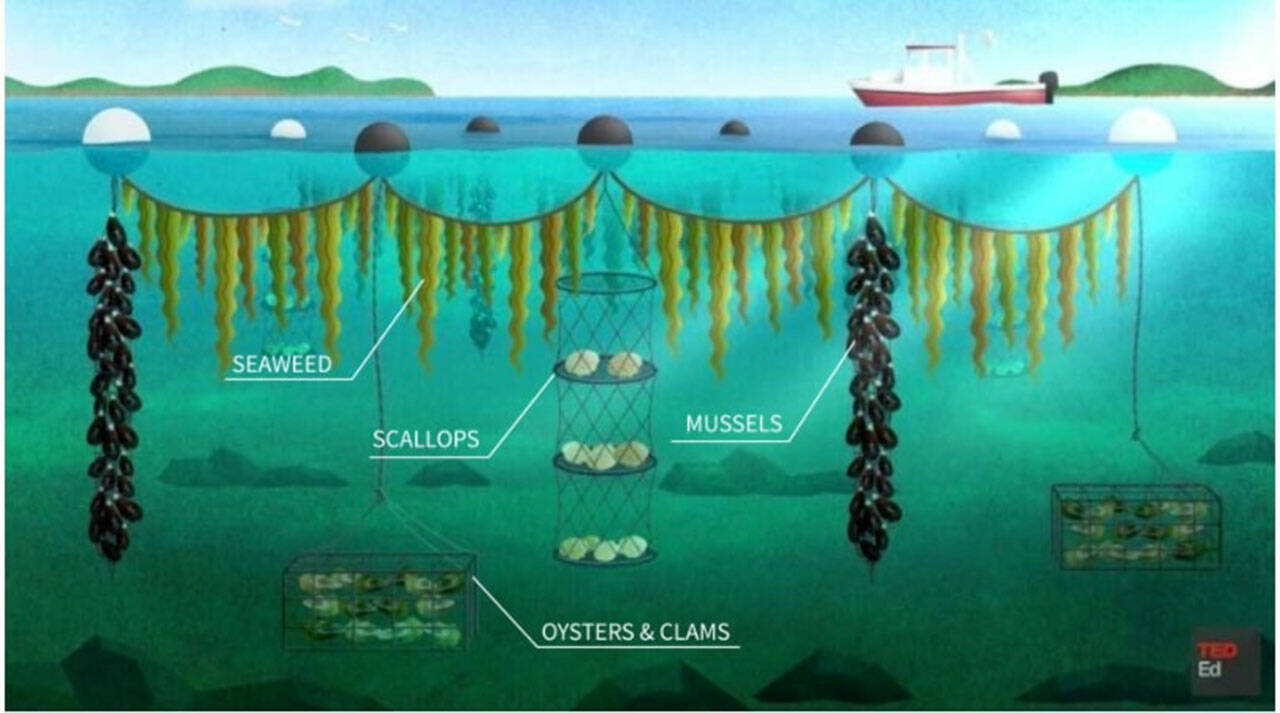Islander Mike Spranger is currently in the midst of the permitting process to operate the second seaweed and shellfish farm in Washington state, as he is planning to operate a 10-acre seaweed and shellfish farm in Colvos Passage.
Spranger became inspired to launch his own seaweed and shellfish farm when he listened to the podcast, “Freakonomics,” on the topic, and said he was “intrigued by the notion of seaweed being a sustainable, regenerative crop.” Having spent the last 30 years working for a logistics company in Seattle, Spranger was also looking for a career change as well.
Spranger plans to grow sugar kelp as the primary crop on his farm, with a small number of oysters, clams and mussels being produced as well. This type of aquaculture differs from fish farming, as it uses no nets. According to Spranger, growing a seaweed and shellfish farm provides many different benefits, including the production of food sources, giving back to the wider ecosystem, and being an example of regenerative farming.
“Seaweed, in particular, sequesters carbon, and carbon is one of the things that’s leading to ocean acidification,” said Spranger. “It also takes in nitrogen and phosphorus…from all of the agricultural and pollutants that go into the water.”
Spranger also describes the shellfish on the farm as “incredible water filters,” as the shellfish filter the water and help to clean it.
“Together, the whole farm creates a really rich, biodiverse marine environment that’ll benefit other species like herring, which supports salmon, which supports seals, and otters and ultimately orca,” said Spranger.
While Spranger’s enterprise would only be the second seaweed and shellfish farm in Washington (Blue Dot Sea Farms was the first shellfish and seaweed farm in the state, and is located off Hood Head, Washington), seaweed farming includes supporters such as the Puget Sound Restoration Group, the Nature Conservancy and the National Oceanic and Atmospheric Administration (NOAA) due to its environmental benefits.
Currently, Spranger is not yet at the point where he is able to open the farm, as he is still obtaining permits from various agencies. So far, though, he has received the necessary approval from the Puyallup Tribe, Washington Department of Fish and Wildlife, and the Washington State Department of Ecology.
Ultimately, Spranger plans to lease waters off of Colvos Passage for his farm from the Washington State Department of Natural Resources and hopes to have all permits in by this summer and establish the farm in the fall. By November, he plans to plant seaweed, as the crop grows when the water is colder.
Spranger has selected the 10-acre section of Colvos Passage because strong currents in the stretch of water will provide rich nutrients to the seaweed and shellfish. The section also has easy boat access and proximity to few residences.
Spranger noted that Asia has dominated the seaweed market, as “95% of the seaweed in the world is grown in Asia.” With the opening of his new farm, Spranger hopes to expand the market for seaweed-based products on grocery store shelves, especially in North America.
“Instead of always having to go to the Asian food store or the specialty aisle, we’re going to try and change the snack aisle so that it includes more seaweed-based products or more seaweed-flavored products,” said Spranger.
The North American market for seaweed-based products is starting to grow, said Spranger, with items like seaweed flavored popcorn, seaweed salsa and seaweed hot sauce showing up on shelves.
“One of the fastest consumer items is going to be snacks,” said Spranger.
Note: Those with questions or comments about the farm can contact Mike Spranger at mikeonvashon@yahoo.com.
Correction: An earlier version of this article stated that Spranger had received permits from the United States Army Corps of Engineers, King County and the Coast Guard. The Army Corps of Engineers is currently in the process of reviewing Spranger’s permit, and the Coast Guard will provide instruction on navigational aids that are required. Spranger has yet to receive his permit from King County. The article has been updated. We regret the error.


